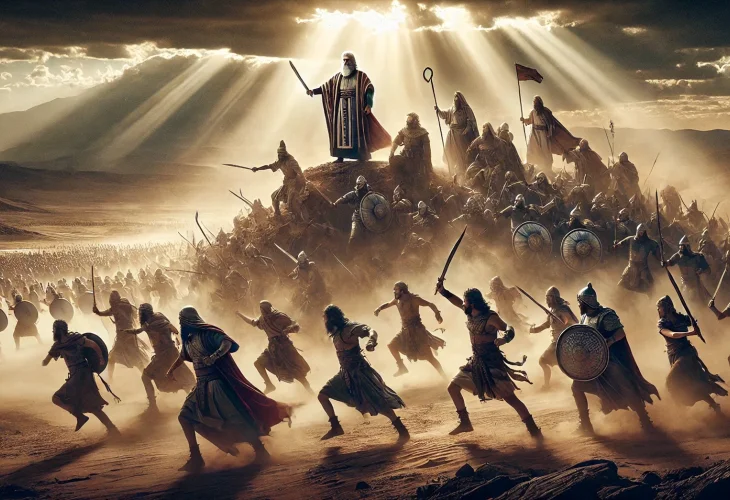Issues in the Bible
Yitro and Amalek: Two Nations, Two Responses to Revelation
The stories of Yitro and Amalek reveal how the Torah transforms revelation into shared responsibility — and the battle between good and evil into a timeless mission

Between the splitting of the Red Sea and the giving of the Torah, two Gentiles come forward, each with opposite intentions toward Israel: one for good, and one for evil. “And Yitro came” — “And Amalek came.” Both heard of the miracles of the Exodus. Both reacted, but in completely opposite ways. Yitro was inspired and joined the Jewish people, entering into a covenant with them, while Amalek was enraged and attacked them.
Israel’s response mirrors the contrast: To Amalek — “Go out and fight Amalek.” To Yitro — “Moshe went out to meet his father-in-law.”
In the end, Amalek is defeated, and Yitro is sent home in peace.
After the war with Amalek, Moshe builds an altar as a sign of God’s covenant to wage eternal war against Amalek. After Yitro’s arrival, Yitro himself brings offerings and joins Israel in a feast of fellowship and covenant.
Thus, immediately after God’s revelation in Egypt, two opposites gather at Israel’s table: One, a Midianite priest who converts and joins the covenant, even advising Moshe on how to teach Torah and shaping an entire section of the Torah itself. The other, a nation descending from Avraham, yet declaring war not only on Israel’s land but on God Himself, becoming the symbol of absolute evil throughout the ages.
The Torah’s Subtle Parallels
The Torah draws a striking literary parallel between these two episodes: When fighting Amalek, Moshe is told: “Choose for us men” (Shemot 17:9). After Yitro’s advice, we read: “Moshe chose capable men” (Shemot 18:25).
Why the need to choose men in both cases? Because Moshe could not act alone. Against Amalek it says, “Moshe's hands grew heavy” (17:12). Yitro says the same words: “The thing is too heavy for you” (18:18). In the Amalek story, Moshe stands “on the hilltop”; in Yitro’s, “all the people stand before you.” Amalek’s battle lasts “until the sun set”; while Yitro’s judgment continues “until evening.” The Torah deliberately echoes its language.
From this we learn that the battle and the judgment are two aspects of the same mission. In the war with Amalek, Moshe delegates power through Yehoshua and Chur, while in Yitro's counsel, through officers of thousands and hundreds. Both are steps toward one truth: that God’s covenant and leadership must be shared among the people.
The Innovation of Sinai: A Covenant with Every Soul
The great revolution of Sinai is that God makes a covenant not only with prophets and saints, but with every person. Before Sinai there were individuals such as Enoch, Shem, and Ever, who knew God. However, Sinai revealed that even the simplest soul, even a child or a maidservant, can stand before God and enter His covenant.
Moses already knew God intimately, since the revelation at the burning bush. Yet before giving the Torah, God teaches him how to extend responsibility — how to entrust the covenant to the whole nation, and to future generations.
Human Ideals Without Divine Guidance
Human ideas can be inspiring, but without divine guidance they often end in tragedy. The French revolutionaries believed they were bringing equality to the world. The Soviet revolutionaries believed they were leading humanity into a communist “paradise.” However, both unleashed violence and corruption they never anticipated.
Even today, progressive ideologies promise a utopian good while ignoring the evil produced in its wake. As the old communist proverb said: “When you chop wood, chips will fly.” Modern “liberals” often repeat the same line.
The Torah, by contrast, is a divine plan for the world. It includes not only ideals, but also the tools to face failure, sin, and human weakness. Because it is divine, and therefore eternal, it acknowledges the existence of evil and teaches how to confront it.
Yitro's Advice: Building a Living Torah
How can the Torah endure forever, ensuring that God’s will is always known? Through delegation and teaching. That is Yitro's insight. Moshe alone could not bear the burden of judgment. He needed to appoint judges — leaders who would continue his mission.
At first, Moshe hesitated. He had received Torah directly from God; how could anyone else interpret it? But God showed him that for the Torah to live eternally, it must also pass through human voices. Even the outsider’s perspective — the convert, and the seeker, has a role in its transmission. Yitro, too, descended from Avraham; he wanted to join the covenant and ensure that Torah could be handed down through ordinary people, not only prophets.
The officers of tens and hundreds became, in effect, the army of the Torah. They are Israel’s true soldiers — those who teach, judge, and carry divine wisdom into daily life.
Amalek: The Eternal Enemy
When God’s presence rests among the people, Israel prevails, and when Moshe raises his hands in faith, they are victorious. However, Israel’s journey would be long, and future generations could not rely on a prophet like Moshe to always lead them. Thus it says, “Moshe's hands were heavy.” He appoints Yehoshua and Chur, passing on the mission.
The command to erase Amalek is therefore eternal. In every generation, there will exist forces of absolute evil. The Torah’s message is that such evil must be confronted and destroyed.
The First Written Law
Before the giving of the Torah, the first law written in the Book was the command to wage war against Amalek. Moshe did not create an army for this; he wrote the command itself into the Torah: “The Lord will have war with Amalek from generation to generation.”
That inscription is Israel’s true weapon — the Torah itself. Through it, Israel knows that the divine plan is eternal good, and that those who carry that plan have the right — and the duty, to eradicate eternal evil.

